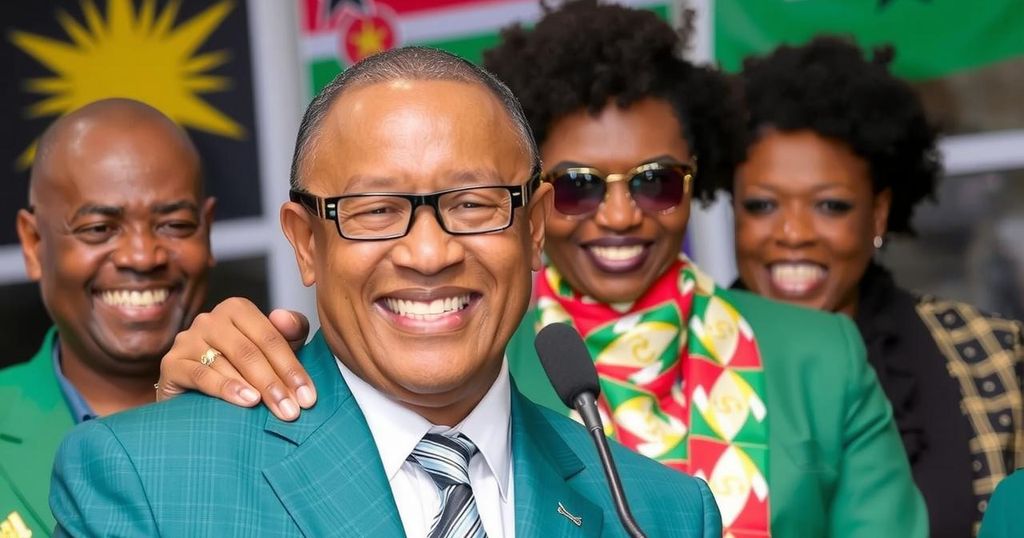World news
AFRICA, ALLIANCE DU CHANGEMENT, ALLIANCE LEPEP, BDP, BOTSWANA DEMOCRATIC PARTY, DEMOCRACY, ELECTIONS, GOVERNANCE, GOVERNMENT, MAURITIUS, MILITANT SOCIALIST MOVEMENT, NAMIBIA, NET, NETUMBO NANDI - NDAITWAH, OPPOSITION, PARLIAMENTARY SEATS, PR, PRAVIND JAGNAUTH, SAHARAN AFRICA, SWAPO
Michael Grant
0 Comments
Namibia Elections: Swapo Faces Electoral Setbacks Amid Regional Trends
Namibia’s Swapo party has held its position but with reduced dominance, indicative of a widespread trend in Africa where many ruling parties face electoral setbacks. In 2024, several governing parties suffered losses due to economic challenges, corruption, and public dissatisfaction, contributing to a vibrant political landscape across the continent. Notably, Namibia’s electoral results have sparked disputes from opposition parties, illustrating ongoing tensions between incumbents and rising challengers.
Namibia’s ruling party, Swapo, has maintained its authority following over three decades in power, yet its dominance has diminished, reflecting a larger trend among African governments struggling with electoral challenges this year. Official results reveal that Swapo’s presidential nominee, Netumbo Nandi-Ndaitwah, won the election with 57% of the vote, marking her as the first woman to lead the nation. However, opposition groups contest the results due to significant logistical issues and alleged irregularities during the elections.
Despite Swapo’s retention of power, its parliamentary performance deteriorated, resulting in a loss of 12 out of 63 seats, raising questions about the apparent discrepancy between the presidential and legislative results. This electoral year has been particularly harsh for many governing parties in sub-Saharan Africa, with incumbents facing considerable backlash amidst rising public dissatisfaction with economic management, corruption, and governance.
The Botswana Democratic Party suffered a significant electoral defeat, losing a substantial number of its seats, while Mauritian governance encountered a similar fate, where the ruling coalition was substantially reduced in representation. Senegal also witnessed a remarkable shift in power dynamics, with the main opposition leader winning the presidency under extraordinary circumstances following governmental repression.
In South Africa, the African National Congress, despite remaining in power, experienced a historic decline in voter support, ultimately having to form a coalition government. This series of changes signifies a notable shift in political landscapes across Africa, where once-dominant parties are increasingly vulnerable to emerging opposition forces.
Economic dissatisfaction, exacerbated by rising living costs, has significantly influenced public sentiment, leading to widespread demands for accountability and democratic governance. As observed, this pattern is not isolated to Africa, reflecting a global trend where discontent over economic policies has contributed to political upheaval in various democracies.
The evolution of opposition strategies has proven effective, fostering greater electoral scrutiny and collaboration among parties to consolidate voter support. Observers suggest that the pattern of electoral turnover could extend into the following years, potentially impacting memorable elections in countries like Ghana and Malawi.
The events in Namibia typify a broader pattern affecting several African nations in recent elections, where long-standing ruling parties are witnessing declines in voter support and, in some cases, outright defeats. Economic challenges, compounded by heightened public awareness of corruption and demands for improved governance, have ignited intensifying political competition. The ongoing political shifts in both Botswana and Mauritius, as well as in Senegal, point to a rising opposition dynamic that reflects changing voter sentiments, especially among younger audiences disillusioned by mismanagement and authoritarian governance.
In conclusion, the electoral outcomes in Namibia illustrate a significant trend lines in African politics, wherein once-dominant ruling parties are increasingly challenged by organized opposition movements and public demands for accountability. This pattern reflects broader socio-economic factors at play and a growing readiness among citizens to mobilize for democratic change. As the landscape continues to evolve, subsequent elections may yield further challenges to incumbent governments across the region, emphasizing a potential shift towards strengthened democratic resilience.
Original Source: www.bbc.com




Post Comment